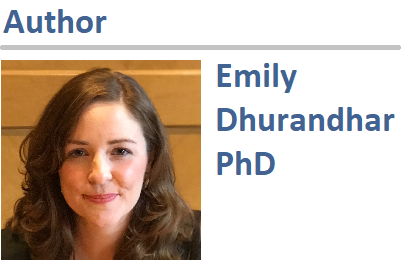
Adding Culture to the Weight-Loss Equation
The math for weight loss is simple. Eat fewer calories than you expend. The challenge arises when we attempt to apply math to the complex physiological system that is the human body. The result? Actually achieving and sustaining negative energy balance long enough for significant weight loss is extraordinarily challenging. Then, addressing obesity on a global scale is even harder. It introduces differences in environments, cultural beliefs and practices, even physiology across races. The difficulty scales up tremendously.
Adapting to the Culture of India
Consider a country like India. It doesn’t come to mind as a hot zone of obesity. But prevalence of obesity in urban India has recently exceeded 50%; significantly more the prevalence in the U.S. Much of the advice given for weight-loss in India is based on what works in the U.S., with limited results.
To address the paucity of evidence-based advice specifically for Indians, Dr. Nikhil Dhurandhar – a U.S.-based obesity researcher and physician – has written a new book called Dr. Dhurandhar’s Fat-Loss Diet, published in his native India. Into 200 pages, he distills his experience of 35 years on the pioneering edge of research, translating science into strategies for obesity management specific to Indian culture and race.
In his book, Dr. Dhurandhar provides advice to navigate challenges unique to Indians. At social functions in the U.S., it is common for a host to offer seconds. In India, however, a polite host will not only offer seconds, but will put significant pressure on guests to eat. That may go as far piling food onto the guest’s plate the moment it is empty, without the guest’s consent.
Another norm in India is that food made in the house is made for the whole family to eat together at family meals. Eating food made for one person’s special weight-loss diet is often a non-starter.
Some dietary considerations are specific to race. Indians are particularly prone to muscle wasting, and typically have a dietary pattern that is already very low in protein. To prevent muscle loss during weight loss, Dr. Dhurandhar calls for a dietary overhaul that significantly changes aspects of the diet related to protein sources during weight loss. On the other hand, for most Americans, getting adequate protein during weight loss isn’t usually such a focus or problem.
Local Strategies for a Global Challenge
To reduce the global prevalence of obesity, obesity medicine experts from every culture will need to be trained to develop culture-specific nuances to successful weight loss. In the meantime, anyone espousing weight-loss advice to someone of a different culture should be particularly careful to ask questions and understand cultural norms to fully address the obstacles someone may face during weight loss.
For a review of India’s shift from undernutrition to overnutrition, click here. Learn more about the Dhurandhar book here.
Today’s guest post comes from our good friend Emily Dhurandhar, Assistant Professor of Kinesiology at Texas Tech University and former chair of the Obesity Society’s Advocacy Committee.
Terrace Farms at Sanasar, Jammu, India; photograph © sandeepachetan.com / flickr
Subscribe by email to follow the accumulating evidence and observations that shape our view of health, obesity, and policy.
May 18, 2018


